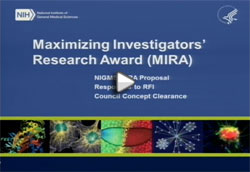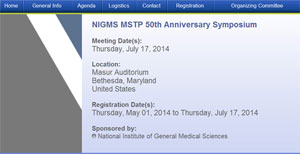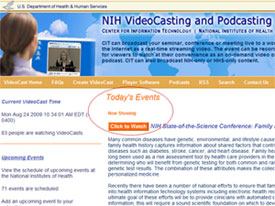 At last week’s Advisory Council meeting, I presented a report on the comments we received in response to our request for information (RFI) on a potential new program for research funding.
At last week’s Advisory Council meeting, I presented a report on the comments we received in response to our request for information (RFI) on a potential new program for research funding.
As described in the blog post announcing the RFI, the Maximizing Investigators’ Research Award (MIRA) program would provide a single award in support of all of the projects in an investigator’s lab that are relevant to the NIGMS mission. A MIRA would be longer and larger than the current average NIGMS R01 award.
We received more than 290 responses through the official RFI comment site. We heard from individual investigators as well as several scientific organizations. Most of the responses were positive, and both established and early stage investigators indicated that they were very likely to apply.
The respondents identified the most valuable aspects of the proposed program as:
- Increased flexibility to follow new research directions as opportunities and ideas arise,
- Savings of time and effort currently spent on writing and reviewing applications, and
- Enhanced stability of research support.
However, some responses expressed concerns, which we are taking into consideration. Despite the intention of the program to optimize the distribution of NIGMS resources, some respondents thought that it could lead to funds becoming concentrated in fewer labs at the most elite institutions. This was in part a reflection of the phased implementation plan, which would focus initially on investigators with more than one NIGMS grant. Respondents urged NIGMS to broaden the eligibility criteria as quickly as possible following the initial pilot phase. Other concerns that were raised related to peer review and program evaluation.
For more about the RFI results, including a breakdown of responses by question, watch my presentation, which begins at 2:18 on the archived videocast.
The Advisory Council discussed the MIRA proposal and then approved plans to proceed with developing the program. We plan to issue a funding opportunity announcement in early 2015, with the first awards being made in Fiscal Year 2016. We intend to evaluate the MIRA program and if it is successful, will broaden it.


 This year is the 50th anniversary of the NIGMS Medical Scientist Training Program (MSTP), which supports research training leading to the combined M.D.-Ph.D. (or other dual) degree. Starting with only three institutions and a handful of supported students, the program has grown to 45 institutions and more than 900 trainees per year.
This year is the 50th anniversary of the NIGMS Medical Scientist Training Program (MSTP), which supports research training leading to the combined M.D.-Ph.D. (or other dual) degree. Starting with only three institutions and a handful of supported students, the program has grown to 45 institutions and more than 900 trainees per year. In September 2009, we announced that we were not reissuing the funding opportunity announcement for our Large-Scale Collaborative Project Awards (Glue Grant) program, which has supported research teams tackling significant and complex problems that are beyond the means of any one research group. We are currently assessing the need for this type of support and how best to manage programs of such scope and magnitude.
In September 2009, we announced that we were not reissuing the funding opportunity announcement for our Large-Scale Collaborative Project Awards (Glue Grant) program, which has supported research teams tackling significant and complex problems that are beyond the means of any one research group. We are currently assessing the need for this type of support and how best to manage programs of such scope and magnitude. Since my last post about PSI:Biology, I’ve received lots of questions about the initiative and the new funding opportunities. To answer these questions more broadly and encourage more applicants, we’re hosting a live
Since my last post about PSI:Biology, I’ve received lots of questions about the initiative and the new funding opportunities. To answer these questions more broadly and encourage more applicants, we’re hosting a live 